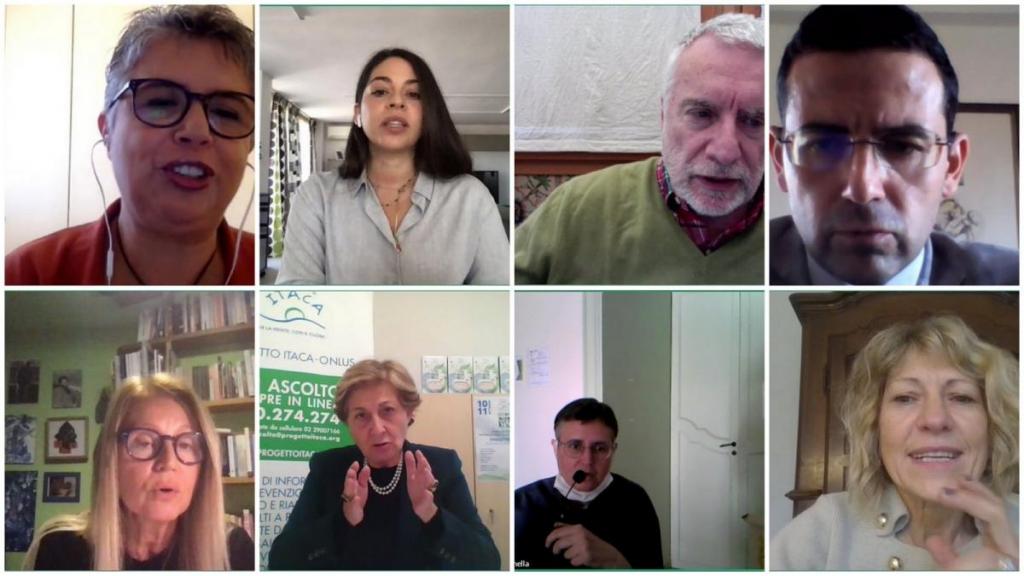“Zedders in lockdown. Growing Up during the Emergency” has just ended. This was the first of six regional events promoted by “Factor J,” a programme organized by the Fondazione Mondo Digitale in collaboration with Janssen Italia and sponsored by the Italian Health Institute (Istituto Superiore Sanità) to educate 100,000 young men and women on inclusion, empathy and the respect of the diversity brought about by illness.
On World Health Day, students, teachers, patients and experts exchanged views on the psychological wellbeing of adolescents to reaffirm the central role of prevention and education to ensure everyone’s health.
Over 500 students attended the event, along with special guest Psychiatrist Paolo Crepet. The “cover story” was dedicated to the experience of Sicilian biologist Concetta Castilletti, one of the virologists who isolated SARS-CoV-2 in February.
For over a decade, “There is no health without mental health” has been the motto of the WHO that has acknowledged that depression is the first cause of worldwide disabilities. And experts are worried about the impact of Covid-19 on our psychological wellbeing, especially that of adolescents and fragile individuals. Indeed, current discussions focus on mental issues as the next possible global pandemic.
How can we detect early signs of unease? How can we face them? What roles are played by family and school in the process of understanding and accepting illness? How can we improve individual capacity to establish emotional relations?
Scientific experts and patients try to answer a few of these questions in today’s event “Zedders in lockdown. Growing Up during the Emergency” organised as part of Programme Factor J (fattorej.org), promoted by the Fondazione Mondo Digitale and Janssen Italia, a Johnson&Johnson Group pharmaceutical company, with the sponsorship of the Italian Health Institute. Over 500 students were connected to the on-line event organised for World Mental Health Day (Oct. 10). The discussion highlighted not only the importance of prevention and early diagnosis, but also the central role of empathy and values, such as respect and inclusion, as fundamental elements for the cure. A total of 323,707 new patients have contacted the Mental Health Department (for 93.4% it’s the first contact with such services): 34,827 are Sicilian. Sicily is the third region, after Lombardy and Emilia Romagna, for patients with mental health issues aged 18-24.
"I developed mixed anxiety-depressive disorder as an adolescent,” explains Eleonora. "It was like being on a swing and swinging from being overactive to depression and utter lethargy.” When Eleonora was bullied by a classmate, she was not able to react and dropped out of school. “I would have like to have seen a specialist, a psychiatrist, but I was too ashamed and spent year at home alone without any social contact.” Thanks to the help of the Club Itaca in Palermo, Eleonora now has a job and launces a message to young men and women: "React! Don’t get depressed. Don’t be ashamed to ask for help!".
“We realized that young men and women aged 14-18 have been somewhat overlooked by services and psychiatric specialization.” Felicia Giagnotti Tedone, President of the Fondazione Progetto Itaca, reaffirms that it is now universally acknowledged that early diagnosis is a guarantee for cure. Research in neuroscience is making fascinating leaps forward and now is the moment to work on improving the situation of local services throughout Italy.”
The objective of Project Factor J, which has already provided courses to over 2200 students since April, is to develop the emotional intelligence and awareness of young men and women on diversity and uniqueness and acknowledge their own issues, or those of others, and improve the level of attention on health to avoid diagnoses being made too late.
“Factor J is a project that we firmly believe will make a difference in our youth, our future, by providing a message of awareness on the impact of illness, promoting respect for patients and trust in the value of science,” explains Loredana Bergamini, Medical Director of Janssen Italia. "At Janssen, we are driven by a belief in a better future, one in which illness will be a memory of the past. Our commitment is not only research and development for treatments, but also to raise greater awareness about diseases, as we are doing with Factor J and the 'You Can’t Fight Depression with Words’ Campaign that we just launched.”
“We are proud of the results that we are achieving with Factor J. Our objective is to start with youth and schools to develop a new culture and sensitivity,” declares Mirta Michilli, Director General of the Fondazione Mondo Digitale, emphasizing the need for a true education to emotions. “It is fundamental to help our youth understand the situation that we are experiencing, accept illness as a normal element in our lives and grasp their strategic role for overcoming the current emergency.”
“Health environments, like schools, are fundamental to prevent the unease of youth.” Stefano Suraniti, Director of the USR Sicily, underlined that schools must retrieve their orientation strategies. “Not just curing but taking care of … Schools can motivate students to be resilient and react to difficulties and unsuccess.”
"If emotional intelligence exists, so does emotional stupidity. And since the latter is far more widespread, I am worried because this means there is an inability to communicate and empathise. A good teacher must have excellent emotional communication skills. We can not only live in the moment.” In his address, Psychiatrist Paolo Crepet placed the accent on the crucial role of school that must overcome distance learning. “We feel that we cannot live without open bars, but schools can close. Schools need far more courage.”
The event inaugurated a series of six regional events with a focus on different project therapeutical areas. After neuroscience, events will also address immunology, haematology, infectious diseases and pulmonary hypertension. The project is promoted by a network of eight patient associations: Associazione Italiana contro Leucemie, Linfomi e Mieloma (AIL), Associazione Ipertensione Polmonare Italiana Onlus (AIPI), Associazione Malati Reumatici del Piemonte (AMaR), Associazione Nazionale per le Malattie Infiammatorie Croniche dell'Intestino (AMICI Onlus), Associazione Nazionale Amici per la Pelle (ANAP Onlus), Associazione Psoriasici Italiani Amici della Fondazione Corazza (APIAFCO), Network Persone Sieropositive (NPS Italia Onlus) e Progetto Itaca Onlus. The Rome Campus Bio-Medico University is our scientific partner.




